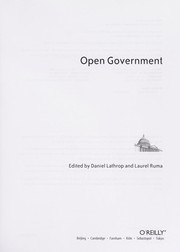Open Government - Collaboration, Transparency, and Participation in Practice by Daniel Lathrop, Laurel Ruma - ISBN 9780596804350 - O'Reilly Media 2010
Motivation
Describe in a sentences or two what motivated me to read this book.
Pre-reading model
Draw a schema (using PmGraphViz or another solution) of the situation of the area in the studied domain before having read the book.
Reading
- 1 A Peace Corps for Programmers
- as IT becomes part of the core activity of the government, author is promoting in-house agile develpment rather than outsourced by contract work
- wanting to connect Washington D.C. with the Silicon Valley
- 2 Government As a Platform
- "Government 2.0, then, is the use of technology - especially the collaborative technologies at the heart of Web 2.0 - to better solve collective problems at a city, state, national, and international level. " (p12)
- "In this model[of Government as a Platform] , government is a convener and an enabler rather than the first mover of civic action. " (p13)
- "what lessons can government take from the success of computer platforms, as it tries to harness the power of technology to remake government? " (p15)
- Lesson 1: Open Standards Spark Innovation and Growth
- "extraordinary power of open standards to foster innovation. When the barriers to entry to a market are low, entrepreneurs are free to invent the future. " (p16)
- "vibrant platforms become less generative over time, usually because the platform vendor has begun to compete with its developer ecosystem. " (p16)
- "recommendations regarding <<cloud-to-cloud>> communication and ensuring interoperability of cloud solutions." General Services Administration (GSA) Infrastructure as a Service (IaaS) solicitation
- on vendor lock in see InformationRules
- Lesson 2: Build a Simple System and Let It Evolve
- quoting John Gall "A complex system that works is invariably found to have evolved from a simple system that worked. The inverse proposition also appears to be true. A complex system designed from scratch never works and cannot be made to work. You have to start over beginning with a working simple system." from Systemantics, Quadrangle 1997
- notion of "choice architecture"
- Lesson 4: Learn from Your <<Hackers>>
- "The secret of generative systems is that the most creative ideas for how a new platform can be used donít necessarily come from the creators of the platform. It" (p29)
- "The whole point of government as a platform is to encourage the private sector to build applications that government didnít consider or doesnít have the resources to create. " (p29)
- Clayton Christensenís of conservation of attractive profits law p30
- Lesson 5: Data Mining Allows You to Harness Implicit Participation
- "Google is a master at extracting value from implicit participation. " (p33)
- "we need to get beyond transparency and, as Google did with AdWords, start building data-driven feedback loops right into the system. " (p33)
- "The most amazing thing about Google is how dynamically the prices for its advertising are set. Every single Google search has its own automated ad auction. The price is set dynamically, matching supply and demand, seven or eight billion times a day. Only financial markets operate at this kind of speed and scale. " (p33)
- Lesson 6: Lower the Barriers to Experimentation
- "for most projects, failure is an option. In fact, technology companies embrace failure, experimentation, and rapid iteration. " (p35)
- mention of Steven Blank and hits "lean startup" concept
- "Platform thinking is an antidote to the complete specifications that currently dominate the government approach not only to IT but to programs of all kinds. " (p35)
- Lesson 7: Lead by Example
- "itís also a mistake to think that you can build a platform in the abstract. A great platform provider does things that are ahead of the curve and that take time for the market to catch up to. Itís essential to prime the pump by showing what can be done. " (p36)
- Government As a Platform, OíReilly Media 2010
- chapter with the Open Feedback Publishing System (OFPS)
- 3 By The People
- "Government information - patents, corporate filings, agriculture research, maps, weather, medical research - is the raw material of innovation, creating a wealth of business opportunities that drive our economy forward. Government information is a form of infrastructure, no less important to our modern life than our roads, electrical grid, or water systems. " (p44)
- 4 The Single Point of Failure
- "The single point of failure results not just from a lack of time or resources or technology. It goes much deeper than that. Simply put, professionals do not have a monopoly on information or expertise, as the social psychologist Philip Tetlock observes. " (p50)
- mention of Peer-to-Patent (p57) Peer to Patent, Community Patent Review opens the patent examination process to public participation for the first time.
See also
Overall remarks and questions
- what is the cost of the government?
- not limited to the fiscal dimension but also to intrinsic limitations
- to use another computer science metaphor, what is the cost of this overhead?
- link with the "anything is an API" concept
Synthesis
So in the end, it was about X and was based on Y.
Critics
Point A, B and C are debatable because of e, f and j.
Vocabulary
(:new_vocabulary_start:)
new_word
(:new_vocabulary_end:)
Post-reading model
Draw a schema (using PmGraphViz or another solution) of the situation of the area in the studied domain after having read the book. Link it to the pre-reading model and align the two to help easy comparison.
Categories
Back to the Menu
 Fabien Benetou's PIM
Fabien Benetou's PIM






